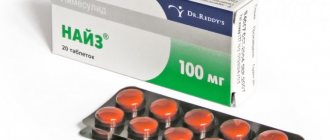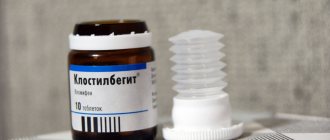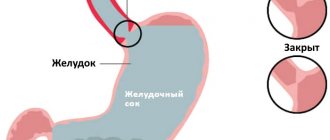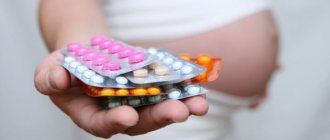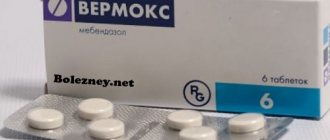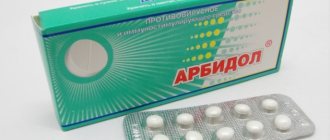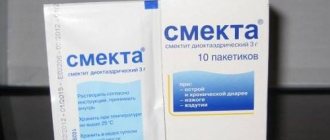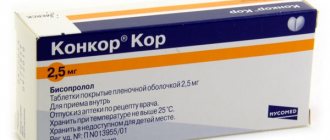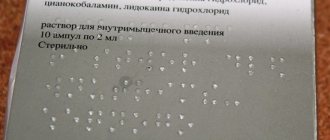About the drug
Nise is a drug belonging to the category of non-steroidal anti-inflammatory drugs of the sulfonanilide class , which has an antipyretic and pain-relieving effect on the body. It is used both to relieve individual symptoms and to treat chronic diseases. Nise is quite popular due to its high efficiency and ability to quickly relieve even severe pain and inflammation.
The active component of the drug, presented both in the form of tablets and in the form of a suspension and ointment (gel), nimesulide, has anti-inflammatory properties (50 and 100 mg of the active substance). It also contains additional substances - calcium hydrogen phosphate, MCC, magnesium stearate.
The drug can be presented in the form of tablets, children's suspension or gel.
- tablets containing 50 mg of active ingredient are available in cardboard packs of 1, 2 or 10 strip packs containing 10 tablets.
- Gel for external use, light yellow in color, is presented in aluminum tubes of 20 and 50 g, and is also sold in cardboard boxes.
- suspension containing nimesulide in an amount of 50 mg per 5 ml is available in 60 ml bottles.
Depending on the form of release of Nise, the indications for its use are:
For tablets:
- Joint pain due to rheumatism and arthritis.
- Bruises and other blunt injuries to the surface of the body.
- Ruptures and inflammation of ligaments and tendons.
- Various infectious and inflammatory diseases.
- Headache, toothache, pain from injuries.
For suspension:
- Fever during infectious diseases.
- Types of arthritis.
- Relief of pain and symptoms:
- after injuries;
- for diseases of the throat, nose and ears;
- for toothaches;
- in the period after surgery.
The gel is used for local treatment of pain symptoms:
- Joint syndrome.
- Arthritis.
- Radiculitis.
- Osteochondrosis.
- Damage and inflammation of muscles and ligaments.
- Soft tissue bruises.
Can pregnant women drink or use it externally?
Many expectant mothers, who have encountered various types of pain and want to quickly get rid of unpleasant symptoms, are interested in the answer to this question. At times, it becomes simply impossible to endure the pain, and only analgesic medications can cope with it.
However, it must be taken into account that during such an extremely important period of a woman’s life as pregnancy, many drugs are simply contraindicated for use. The list of medications prohibited for expectant mothers also includes Nise , which is clearly stated in its instructions in the contraindications section.
Experts clearly agree that some analgesic drugs, including Nise, are strictly contraindicated for women during pregnancy. Painkillers are especially undesirable for women suffering from:
- pathologies of the liver and kidneys;
- bronchial asthma;
- diseases of the stomach and duodenum.
Doctors have also proven that these medications can cause serious abnormalities in fetal development .
In the early stages: in the 1st trimester
This period is the most important for the formation of the fetus, its cells and organs, and any external influence is undesirable. This especially applies to such potent drugs as Nise. Even the active substance in gel form, which is considered safer due to external and targeted use, is strictly contraindicated for pregnant women, since it is absorbed into the bloodstream and thus can harm the unborn child.
In the 2nd and 3rd trimester
The formation of the fetus continues actively, and any influences from the external environment can affect these processes. At these stages of pregnancy (especially in the last three months), Nise is contraindicated in the same way as in the first trimester.
Its systematic use can lead to disruptions in the development of the child’s main body systems , primarily cardiovascular, nervous and endocrine, as well as cause deformities or lead to the most terrible consequences.
For a woman, the greatest danger is the risk of uterine atony, manifested in severe bleeding. The condition is especially dangerous when the bleeding is internal.
During pregnancy, you need to be especially careful about your health and coordinate the use of any medications with a qualified specialist. A single use of Nise is not expected to cause harm to the health of the expectant mother and fetus, but after this you should definitely consult a doctor.
Cases of overdose
Like many medications, Nise also has contraindications for use. So, tablets should not be taken in the following cases:
- if hypersensitivity to any component, including nimesulide, has been detected;
- a patient with bronchial asthma currently has a relapse of polyposis, an allergy to acetylsalicylic acid;
- if there is erosion or ulcer of the gastrointestinal tract, cerebrovascular or other gastrointestinal bleeding;
- any inflammatory diseases have worsened in the intestines;
- blood clotting is impaired;
- liver diseases;
- heart or liver failure;
- alcoholism, drug addiction;
- hepatotoxic reactions to nimesulide;
- hyperkalemia;
- renal failure and other serious kidney diseases;
- if coronary artery bypass surgery has recently been performed, that is, heart surgery;
- there are contraindications for pregnant women, since the medication causes serious side effects, which can lead to miscarriage or fetal death;
- if the child is under 12 years old.
Considering the listed contraindications for use, the doctor, however, can make an exception and prescribe Nice if there is:
- coronary heart disease and congestive heart failure;
- dyslipidemia/hyperlydemia; diabetes; peripheral arterial disease; suspicion of a gastrointestinal ulcer;
- somatic diseases;
- elderly age;
- long-term use of NSAIDs;
- taking antiplatelet agents, anticoagulants, oral corticosteroids, SSRIs.
The number of cigarettes smoked and alcohol intake are also taken into account.
If the patient does not follow the instructions for using the medication Nice, he may experience an overdose. Then adverse reactions are clearly expressed. For example, gastrointestinal irritation, kidney dysfunction or liver failure, seizures or increased blood pressure. A person may suffer from severe headaches for several days.
What symptoms occur when taking a large number of Nise tablets? The dosage of this medication must be determined by your doctor. If the drug is accidentally ingested (in large quantities), the patient may develop the following symptoms: convulsions, increased blood pressure, irritation of the gastrointestinal mucosa, impaired renal function, liver failure and respiratory depression.
To eliminate such conditions, the patient's stomach is washed, activated charcoal is prescribed and symptomatic therapy is carried out.
Instructions for use of tablets, suspension, ointment (gel)
Patients who do not fit into the categories listed in the contraindications may take Nise at the following dosage:
- Tablets - 100 mg twice a day before or after meals. The maximum dosage is 400 mg.
- Suspension – 100 mg twice a day, preferably before meals.
- Gel for external use - 3-4 times a day, apply a thin layer to a clean skin surface, the amount depends on the area being treated.
The duration of use of the drug, regardless of the form of release, is 10 days.
Side effects
Oral forms
| Lymphatic circulatory system: |
|
| Skin, subcutaneous tissues: |
|
| SSS: |
|
| CNS: |
|
| Respiratory system: |
|
| Sense organs: |
|
| Gastrointestinal tract: |
|
| Liver, bile ducts: |
|
| General disorders: |
|
| Urinary tract, renal apparatus: |
|
| Allergic reactions: |
|
Gel
Subcutaneous tissues, skin: uncommon – swelling, burning, itching; extremely rare - severe or moderate skin irritation, desquamation, rashes, erythema, hyperemia, peeling.
Overdose
Did you know that...
Next fact
In case of overdose, the same side effects occur, but more pronounced. Apathy, drowsiness, nausea appear, blood pressure rises, and sometimes gastrointestinal bleeding and acute renal failure develop.
Therapy begins with taking sorbents, gastric lavage, and prescribing osmotic laxatives.
Contraindications
Pills
Individual intolerance; incomplete or complete combination of intolerance to ASA and other NSAIDs (including in the medical history), bronchial asthma, recurrent polyposis of the paranasal sinuses or nose; active gastrointestinal bleeding; erosive and ulcerative changes in the mucous membranes of the stomach and duodenum; worsened inflammatory bowel pathologies (ulcerative colitis, Crohn's disease); cerebrovascular or other bleeding; bleeding disorders (including hemophilia); decompensated heart failure; liver failure or active liver disease; alcoholism and drug addiction; progressive kidney pathologies; development of hepatotoxic reactions in the anamnesis due to the use of nimesulide; renal failure is severe; diagnosed hyperkalemia; parallel treatment with other hepatotoxic drugs; age up to 12 years; the period following coronary artery bypass grafting; pregnancy and breastfeeding.
Gel
Individual intolerance (including other non-steroidal drugs); pregnancy; a combination of intolerance to other NSAIDs or ASA, recurrent polyposis of the paranasal sinuses and nose, bronchial asthma (incomplete or complete); dermatoses; breast-feeding; exacerbation of erosive and ulcerative lesions of the gastrointestinal tract; skin infections and damage to the epidermis at the site of planned application; severe renal failure; age up to 7 years; severe liver failure.
Video: “Nise in 100 mg tablets”
During pregnancy and lactation
is not used during pregnancy or breastfeeding . To use the medication during lactation, you must first stop breastfeeding.
The use of nimesulide may adversely affect fertility. For patients planning pregnancy, it is better to choose another drug.
Analogs
Pregnancy progresses individually for each woman, therefore, when using any medications, it is imperative to consult with a qualified doctor . Some painkillers are still allowed for expectant mothers, depending on their condition.
- The safest analogues of Nise are considered to be drugs containing Paracetamol, for example Fervex, Efferalgan and Panadol.
- No-shpa is safe for the health of a pregnant woman.
They have antipyretic and anti-inflammatory properties and can also relieve pain without harming the health of the woman and fetus.
Sometimes doctors prescribe a one-time use of Analgin, but it should be taken with caution. In the early stages, Nurofen can serve as an analogue of Nise.
Contraindications
- peptic ulcer in the acute stage;
- hypersensitivity;
- severe renal and liver failure ;
- pregnancy, lactation.
Use caution when prescribing to patients with arterial hypertension , diabetes mellitus , and systemic lupus erythematosus . Due to possible drowsiness, there are restrictions when driving.
Folk remedies and methods of prevention
If the pain is not severe and does not require urgent medical intervention, traditional medicine can come to the rescue, which can be easily used at home . So, to relieve unpleasant symptoms, they advise:
- Herbal teas. Decoctions of lemon balm, raspberry, chamomile, cherry leaves, as well as other warm infusions will help relieve mild pain. Various rinses can help with toothaches.
- Massage. Light stroking can relieve spasms and reduce discomfort.
- Various types of compresses. This method is suitable for combating pain in the back, arms and legs, as well as bruises. Compositions can vary from a compress of warmed cherry pits to potatoes, peppers and bay leaves.
- Essential oils can be quite effective against migraines. Oils of lemon balm, juniper, mint, lemongrass and lavender can be rubbed into the temples and the back of the head, as well as inhaled for colds.
Important! If a pregnant woman experiences symptoms such as severe nagging abdominal pain, bleeding and severe headaches, including darkening and blurred vision, she should immediately seek emergency medical help. Taking painkillers, let alone self-medication in these cases, will not bring any benefit.
When it comes to women preparing to become mothers, any risks to the health of the patient and her unborn child are simply unacceptable. You should very carefully monitor the medications you take and exclude any intervention that could cause harm.
The analgesic and anti-inflammatory drug Nise is strictly contraindicated during pregnancy, but it can easily be replaced with analogues confirmed by doctors that are safe for the health of the mother and child, or relieve painful symptoms at home.
